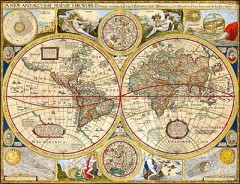 I like history. In another lifetime I would have been an historian or a history teacher. But that interest came too late, and so now I write, using history where I can.
I like history. In another lifetime I would have been an historian or a history teacher. But that interest came too late, and so now I write, using history where I can.
There are many lessons to be learned from history. I still can’t fathom why some people consider history as without value. But I also can’t fathom why people hang the toilet paper going behind the roll instead of in front of it – which is the only correct and proper way to hang toilet paper. But I digress.
History shows us again and again two major things;
- People with differing points of view often fight each other
- In the long lens of history, nobody’s point of view has more value than anyone else’s
To the first point, it is common for one person or group to believe that their ideas – no matter the origin, historical context or facts to the contrary – are somehow inherently better than anyone else’s. To take it a step further, they believe their ideas are better than everyone else’s. And, when taken to its logical conclusion, that anyone (and everyone) who doesn’t hold their views is not just “not superior” but is actually inferior.
To put it another way, culture A believes that you should plant your wheat in north-south rows. Culture B doesn’t. So not only is culture B not enlightened, they are degenerate. This is sometimes a fine point, but one I feel needs to be understood.
To the second point, history is clear that it doesn’t matter which way you grow your grain, or wave you Flimjaflammer, or paint your oxen, or follow your religion. In the end, they are added to the broad base of human knowledge, and mankind stumbles awkwardly forward.
It’s been happening since the first nomadic tribes of proto-humans bumped into each other in search of food, and it’s happening right now. And I am perfectly willing to admit that I am as guilty as anyone, at least in some areas of my life. Let’s just say that I’m not exactly level-headed and even-keeled when it comes to discussing politics. I challenge you, dear reader, to tell me (and the world) just what it is that you have a superiority complex over.
And then I want you to think of a couple events out of history; events that were caused by the exact same superiority complex – though with a different particular subject – that I have with politics, and you likely have with religion, or your brownie recipe, or your favorite band, or whatever. Let’s take an objective look at where that kind of thinking can take us Earth-dwellers.
- The Peloponnesian War between Athens and Sparta. These two great cities had battled together to fight off the Persians years before, but once left with no major external threats, turned on each other. Athens believed it was superior because it was a center of learning and culture, and because of its great navy. Sparta believed it was superior because of its dedication to all things military. Sparta ended up winning the war in 404 BC, but that was really the end of the golden age of Greece, so both sides lost in the end and allowed Rome to rise in the west.
- The Mongol Invasion of Asia, Europe and the middle east. It seems the Mongols believed their own culture (horse-riding nomadic warrior life)
 was superior to all others, to the extent that they wiped whole nations off the face of the planet and razed entire cities, slaughtering whole populations, including women and children. There is no way to even estimate the death toll of these wars, but it’s a conservative estimate to say it extends into the millions of dead, and the world we live in today was shaped in large part by this invasion. And just a reminder to you history-haters, that means Genghis Khan has directly influenced your life, and he’s been dead for almost 600 years!
was superior to all others, to the extent that they wiped whole nations off the face of the planet and razed entire cities, slaughtering whole populations, including women and children. There is no way to even estimate the death toll of these wars, but it’s a conservative estimate to say it extends into the millions of dead, and the world we live in today was shaped in large part by this invasion. And just a reminder to you history-haters, that means Genghis Khan has directly influenced your life, and he’s been dead for almost 600 years! - The Napoleonic Wars, which lasted twelve and a half years, were the result of Napoleon’s belief that France was a superior culture, and his military was a superior fighting force. These wars ravaged Europe and left between 3.5 and 6.5 million people dead.
- The Cold War, which thankfully never became a “hot” war, still cost millions of lives due to proxy wars and espionage activities. In addition, there is no way to calculate the billions of dollars spent by both sides to oppose the other. And all of this because the ideologies of capitalism and communism were in conflict. The U.S.A. believed that communism was a cancer that would infect the world if left unopposed, and the U.S.S.R. believed the West to be debased and corrupt, using the common man like fuel to keep the fires of capitalism burning.
Believing in something is not a bad thing. On the contrary, I feel belief is only of the only true motivators in this world. If you have nothing to believe in, nothing to fight for, what gets you out of bed in the morning? Even if it’s looking forward to a good cup of tea or a new movie. We don’t do things without a reason, something we believe is worth doing.
The problem comes when your belief becomes more important than relationships with people. I know. Really, I do. People need people. We’re social creatures by nature, and without others to interact with – one hopes positively – we wither and die. When we interact negatively with the people around us, judging them to be inferior, or their views to be degenerate or somehow inherently faulty, we degrade ourselves more than anything else. When I lose my cool and go off on a Facebook Rant about some political issue I’m all hopped up about I cause – as my wife has pointed out more times than she probably cares to admit – conflict of a negative and destructive nature. In effect, I damage the relationships I have with my friends and family. And even those not involved in my ranting will view me as less kind, less caring, less wise.
And this is the same with you, dear friends. If you are, like I am, suffering from Belief Superiority Complex – also known as ‘yell at people until they believe you syndrome’ – you need to think about whether it will help you – and whether it will help others. I’m here to tell you it won’t help anyone; this kind of conflict can only bring harm to you and your friends.
It’s difficult to stop. No, actually it’s easy to stop. I’ve done it dozens of times. It’s difficult to stick with it: Difficult to take that deep breath before sending a rant to someone who cares about you. But you must try just as I will try. Again.
To Mark H. and Matt and Erin B., to Bob and Theresa P., to David and Karen H., and to any others who feel I’ve attacked them and tried to force my “superior” beliefs on them, I’m sorry. I can’t say I’m going to change my mind, but I’ll try again to discourse instead of shout. I would ask you to please do the same.
All of you. Everywhere. Can’t we please just talk?